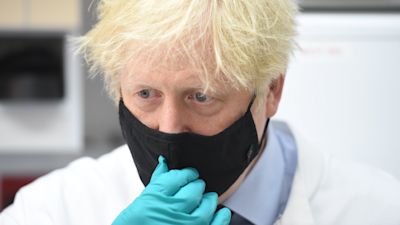Covid lockdown restrictions will not end before July 19, Boris Johnson suggests

June 21 was not the day many businesses were hoping for, reports ITV News Political Correspondent Carl Dinnen
It is unlikely the easing of lockdown restrictions will come before the "terminus" date of July 19, the prime minister has suggested amid calls for an earlier reopening.
The lifting of coronavirus measures has been delayed from June 21 to July 19, was announced last week due to concerns over the spread of the Delta variant.
When asked if easing could be brought forward, Boris Johnson pointed to the rise of the Delta variant, which is causing an increase in hospitalisations and ICU admissions.
He said the vaccination programme was "going gangbusters" but added "look at the numbers of the Delta variant, it is sadly going up still... so we’ve got to be cautious but we’ll be following the data the whole time.
Mr Johnson said July 19 was "looking good" but did not rule out future winter lockdowns amid warnings from scientists.
"You can never exclude that there will be some new disease, some new horror that we simply haven't budgeted for, or accounted for," the Prime Minister told reporters.
He added: "I think what the scientists are saying is that things like flu will come back this winter, we may have a rough winter for all sorts of reasons, and obviously there are big pressures on the NHS.
"All the more reason to reduce the number of Covid cases now, give the NHS the breathing space it needs to get on with dealing with all those other pressures, and we are certainly going to be putting in the investment to make sure that they can."
Number 10 said a two week review on the issue was "unlikely" to result in an earlier unlocking since the delay to Stage 4 was announced last week.
However, a relaxation to the number of people that can attend weddings and funerals will take place - removing the 30-person cap for weddings, with venues instead asked to limit numbers based on space required to enforce social distancing measures.
Listen to our politics podcast, Calling Peston:
Health Secretary Matt Hancock said the UK government continues to look at the data, before adding: "We're being cautious."
When asked whether the remaining restrictions are likely to be lifted before the new roadmap date of July 19, Mr Hancock said: "We are looking at the data, and we’ve said that we’ll take a specific look two weeks into the four-week delay that we had to put in place to get more people vaccinated, so we’ll do that.
"But I have every confidence that the more people get vaccinated, the easier it is, the safer it is to lift restrictions. We had to have the delay in order to get more people vaccinated, especially those second vaccines to protect people, we’re being careful, we’re being cautious.
"But I have a high degree of confidence that this vaccine is going to get us out of this, and the more people who come forward, the easier that will be."
His comments come as more than one million Covid-19 jabs were booked in just two days after the NHS opened its vaccination programme to all remaining adults in England.
A total of 1,008,472 appointments were arranged over Friday and Saturday through the booking service, NHS England said – an average of more than 21,000 every hour, or six every second.
The full figure is likely to be higher as it does not include appointments at local GP-led vaccination services or people getting the jab at walk-in centres.
The NHS has now administered around 62 million doses since Margaret Keenan became the first member of the public to get a jab on December 8.
Four in five adults have now received their first vaccination, according to NHS England figures – with three in five having both.
Public Health England’s Covid-19 director Dr Susan Hopkins said on Sunday she hoped all people over 40 could get their vaccine before the full easing of lockdown restrictions planned for July 19.
NHS England chief executive Sir Simon Stevens said: “It is fantastic to see so many young people coming forward to play their part, protecting themselves, their friends and their family – nearly nine million people in their twenties and thirties have now had their first dose.”